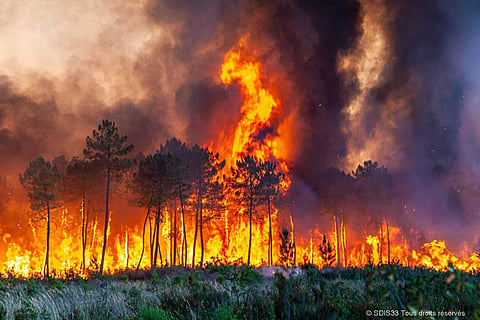

MADRID: Spain's Ministry of Health reported on Wednesday that 679 people had lost their lives in the first eight days (July 10-17) of the second heatwave that hit the country this summer.
The Carlos III Health Institute (ISCIII) said that 169 deaths occurred on July 17 alone, according to the news agency, Xinhua.
The Health Institute noted, 430 of the 679 victims were aged 85 or over, 159 were between 75 and 84 years of age and 58 were between 65 and 74 years.
The second heatwave of the summer ended with slightly lower temperatures on Tuesday, but this promises to be a brief respite, with temperatures expected to exceed 40 degrees Celsius again in much of the country before the weekend.
The first heatwave of 2022 in Spain lasted from June 11 to June 17 and caused 829 deaths, the institute said. Accordingly, a total of 1,508 people have died in the country this summer due to the excessive heat, Xinhua reported.
Extreme heat in Western Europe is causing devastating wildfires in France and Spain, and unprecedented drought in Italy and Portugal, according to World Metrological Organization (WMO).
According to the UN's World Meteorological Organisation (WMO), the UK recorded its highest ever temperature of just over 40 degrees Celsius on Tuesday, at London's Heathrow airport. With temperatures expected to remain above normal until the middle of next week, the WMO warned that heatwaves will occur more and more frequently, into the 2060s.
WMO briefed journalists that the European heatwave may not end, until the middle of next week.
The heatwave also acts as a kind of atmospheric lid, WHO explained, trapping pollutants, and degrading air quality, with adverse health consequences, particularly for vulnerable people such as the elderly. In the major 2003 heatwave in Europe, some 70,000 people died, UN News reported.
"Climate change is affecting our health in many ways, not only by heatwaves which are having direct consequences" but also other areas of essential healthcare, such as rising levels of disease, alerted Maria Neira, Director for public and environmental health at WHO.
She explained that reliable access to food and water is at stake, as with agricultural production levels at risk.She said that 99 per cent of the global population is breathing air that does not meet the health standards set by WHO, hugely impacting chronic respiratory and cardiovascular conditions.
"The best solution to this will be, again, being very ambitious on tackling the causes of this global warming. We have been alerting for a long time that climate change is affecting very much human health", she emphasized, which will also impact the struggle to reach net zero carbon emissions, and the crucial transition to clean, renewable sources of energy.
More deaths among the elderly and those with pre-existing health conditions are feared due to the ongoing heatwave in the weeks ahead, and subsequent challenges to health systems, to keep up with rising demand